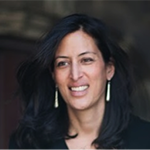
About
Dr. Sabina Shaikh is an Economics Lecturer in the Program on Global Environment and Public Policy Studies at the University of Chicago. She is the founder and Director of the Environment, Agriculture and Food (EAF) working group, in which she leads undergraduate and graduate students on research projects related to urban environment and food policy issues. Dr. Shaikh and her students recently contributed to the creation of a new national green certification for foodservice establishments, and are currently working with local partners on a sustainability plan for Chicago’s professional sports community. Her research and teaching focuses on the economics of the environment and includes applications to urban sustainability in the City of Chicago related to climate change, water management and the valuation of natural assets, the connections between natural resources, environment and food systems and the economics of ecosystem change in the developing world. Dr. Shaikh contributes services as a board and committee member for several organizations in Chicago including the Green Chicago Restaurant Coalition, Greenleaf Advisors and the Metropolitan Planning Council. She is also the co-principal investigator on a recently awarded National Science Foundation grant by the National Science Foundation to study the impacts of hydropower development and climate change on water sustainability and agricultural productivity in the Mekong River Region of Cambodia. Dr. Shaikh has published in numerous scholarly journals, including American Journal of Agricultural Economics, Ecological Economics, Economic Inquiry, Environmental Practice and Land Economics. She has recently contributed book chapters to Natural Capital: Theory and Practice of Mapping Ecosystem Services and the Handbook of Metropolitan Sustainability. At the University of Chicago, Dr. Shaikh teaches environmental economics, economics for public policy and environment, agriculture and food economics and policy. Dr. Shaikh holds a B.A. in Economics from the University of Wisconsin and a Ph.D. in Agricultural and Resource Economics from the University of California at Davis. How did you first get involved in the green industry? I studied economics in college and was personally interested in environment. I found that economics, as a study of human behavior could be a powerful tool for environmental management. In graduate school, I continued my study of economics, but with particular focus on agriculture and environment. What interests you most about being green? I am most interested how information and incentives can affect people’s behavior toward environment. I think there is great potential to change behavior through education and informed communication. What is your biggest “green” pet peeve? My biggest pet peeve is the gross lack of awareness that the human race depends on a clean and healthy environment for survival. What green trend is most exciting to you or your industry? The emergence of environmentally focused start-up companies is changing the business community and influencing large-scale change throughout the corporate and policy world.Episodes
-
January 9, 2015
Examining Environmental Education with University of Chicago’s Dr. Sabina Shaikh
The University of Chicago's Dr. Sabina Shaikh is an expert in examining the relationship between environment and economics.